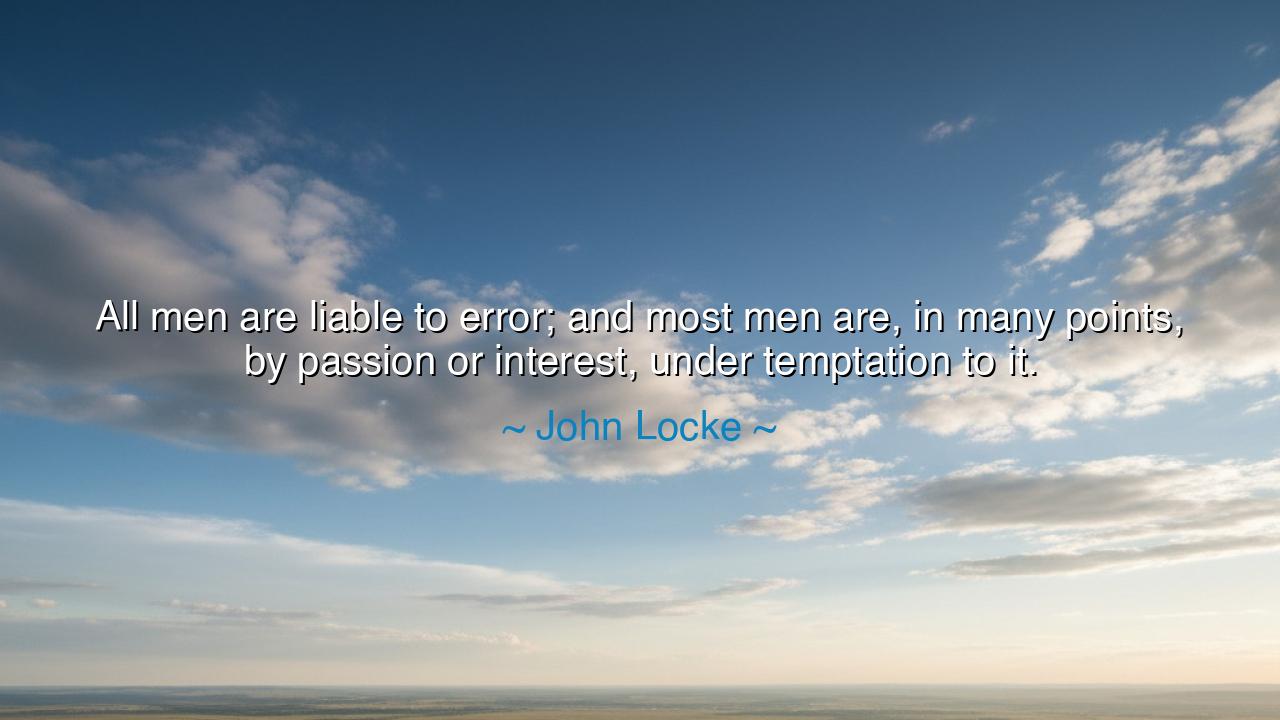
All men are liable to error; and most men are, in many points, by
All men are liable to error; and most men are, in many points, by passion or interest, under temptation to it.






Hear the solemn wisdom of John Locke, philosopher of liberty and reason, who declared: “All men are liable to error; and most men are, in many points, by passion or interest, under temptation to it.” These words shine like a lamp in the darkness of pride, reminding us that fallibility is the common inheritance of mankind. None, however great, is free from the shadow of error, and most, driven by desire or swayed by advantage, stumble willingly into it. This is not a curse laid upon us, but a truth revealed—that humility is the beginning of wisdom.
The origin of these words lies in Locke’s meditations on human understanding. He saw clearly that the mind of man is not an unshakable fortress, but a vessel swayed by winds of passion and currents of interest. Though reason is given to us, it is often silenced by greed, ambition, fear, or anger. Thus, the errors of men are not always born of ignorance, but of willful surrender to temptation. To know this is to guard oneself against falsehood, and to treat the errors of others not with arrogance, but with compassion.
History thunders with examples of this truth. Consider Julius Caesar, whose brilliance as a general and statesman none could deny. Yet when passion for power seized him, when ambition whispered of crowns and empires, he ignored the warnings of friends and the traditions of Rome. His interest overcame his reason, and though he gained dominion, he lost his life upon the Senate floor. Even the mightiest are not spared from error, for the temptation of desire binds kings as tightly as common men.
Or look to the story of the Trojan War. The people of Troy were not ignorant; they were seasoned by ten years of struggle. Yet when they saw the wooden horse, passion for victory and interest in peace overcame their caution. Their minds yielded to the temptation, and in that single error, the city that had stood for ages was reduced to ashes. Locke’s words live here as prophecy: men, even when wise, fall easily when blinded by what they most crave.
The meaning of Locke’s insight is both humbling and empowering. It humbles us, for it strips away pride and shows that no man—whether philosopher or soldier, king or peasant—is free from stumbling. Yet it empowers us, for if we know our weakness, we may guard against it. The man who says “I am beyond error” is already undone; but the one who says “I am tempted, and therefore I must be watchful” walks the path of strength. Awareness is armor, and humility is shield.
The lesson is plain: trust not blindly in yourself, nor in others, without testing words against reason. Beware of the sway of passion, for it clouds judgment. Beware of interest, for it blinds the eye to truth. Seek counsel not only from those who agree with you, but from those who challenge you, for truth often comes from contradiction. And when you fall into error, as surely you will, rise with humility, confess it, and learn from it—for that is the path of wisdom.
Practical actions flow from this. When anger burns, delay your decision, for passion fades with time. When profit beckons, ask yourself whether gain is worth the cost to conscience. When pride tempts you to despise the mistakes of others, remember your own. Cultivate patience, self-examination, and the courage to say, “I was wrong.” In doing so, you rise above the blindness that has destroyed empires and broken hearts.
Thus, let Locke’s words be carried as a warning and a guide: All men are liable to error. Accept this, and you will walk humbly. Most men fall by passion or interest. Guard against this, and you will walk wisely. For though none may escape temptation, those who live watchful and true may turn their frailty into strength, and their stumbling into stepping stones upon the path of virtue.






AAdministratorAdministrator
Welcome, honored guests. Please leave a comment, we will respond soon